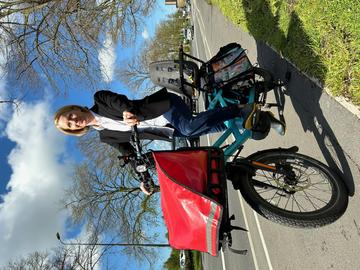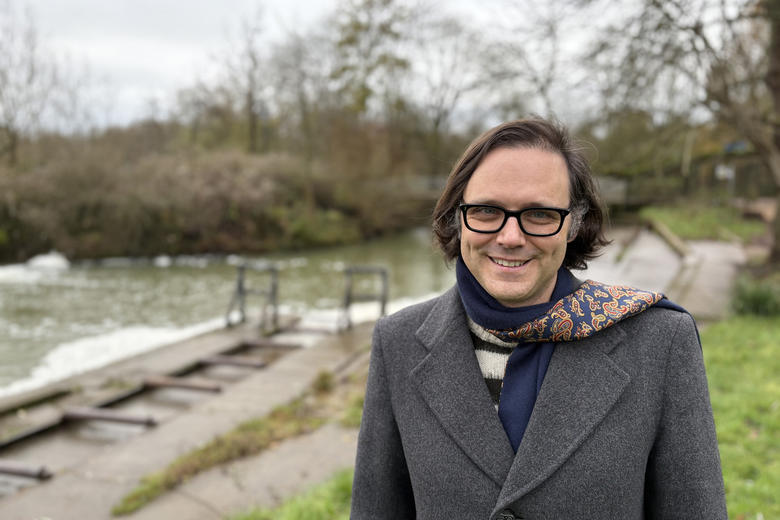ALUMNI STORIES: 'I HAVE ALWAYS HAD THIS OTHER SIDE TO ME THAT IS WORLD-FACING, PRAGMATIC, AND BUSINESS-ORIENTATED'

ALUMNI STORIES: 'I HAVE ALWAYS HAD THIS OTHER SIDE TO ME THAT IS WORLD-FACING, PRAGMATIC, AND BUSINESS-ORIENTATED'
Soon-to-be lawyer Dr Liz Sawyer (Trinity, 1999) speaks about her local involvement in an Oxford start-up that is revolutionising parcel delivery through cargo bikes
Published: 25 April 2023
Share this article
Dr Liz Sawyer (Trinity, 1999) epitomises a twenty-first century career, morphing from Oxford classicist to a planning and environmental lawyer and director of Pedal and Post, a local Oxford company transforming how parcels are delivered in British cities.
Tell us about your Oxford academic career
I was at Trinity College for my BA, my MPhil and my DPhil; then I was an Associate Researcher at the Ioannou Centre for Classical and Byzantine Studies from 2014-2021, doing graduate teaching as well as research. Along the way I was Director of Events, Education, and Outreach at an antiquities gallery based in Mayfair.
What prompted your career change?
I realised that I wanted a career with more real-life impact, and that I loved advocacy work. I decided to retrain as a lawyer specialising in planning and environmental law. It’s a long haul but I’m looking forward to being called to the Bar next year, and starting legal work is incredibly exciting.
You have very recently become a director to grassroots Oxford company Pedal and Post, a cargo bike delivery company in the midst of a crowdfunder. How does a classics tutor become a company director?
I have always had this other side to me that is world-facing, pragmatic, and business-orientated. And I’m not the only academic to be able to say that. In fact I’d go so far as to say that the older ‘ivory tower’ idea of academics is demonstrably untrue in the majority of cases, perhaps especially at Oxford where we have been pushing out an incredible array of spin-outs attracting serious capital investments.
Tell us more about Pedal and Post
Actually, it is not a University-linked company and nor at this point is it a start-up! It began life a decade ago with the local founder and CEO Chris Benton selling coffee from a big Dutch cargo bike in Little Clarendon Street. Many of his customers worked inside the adjacent Wellington Square University Offices so in this sense maybe it is closer to the University than it seems – but it doesn’t owe its existence to University research or intellectual property.
How did you get involved?

I was extremely frustrated with Oxford’s traffic congestion. We live on the Botley Road, and anyone who knows Oxford knows what that means: a great deal of traffic, noise, and pollution. Journeys by car became tiresome and unreliable. One day I saw a woman riding a cargo bike with several children inside it happily chatting away, and I realised that she had the solution. Despite not having ridden a bike that much I can honestly say it was a life-changing decision, and for the better!
First of all it's an electric bike so I could throw out the notion that I (or anyone else) wouldn’t be strong enough. E-Bikes or ‘pedelecs’ as they are technically known, are game-changers: obstacles such as hills, cargo, and even simply getting too sweaty are no longer an issue at all.
Secondly, I was suddenly able to plan my day knowing that I could arrive anywhere in the city on time, and typically by taking a beautiful route through a park or along quiet residential streets. That was an incredible moment – the city reorientated itself in my mind, with the roads fading away and the green routes becoming my new highways. The reduced exposure to pollution mattered a great deal to me because I had young children at the time. A few months later I heard a talk by Chris about Pedal and Post. He was so knowledgeable and committed to changing how parcels are delivered that I immediately asked him if I could invest in his company. Initially I was just a shareholder, but later Chris asked me if I could also be a director.
Logistics sounds a bit male, because most van drivers seem to be men. What’s your take on that?
Well, gender stereotyping is a big issue that prevents a wider range of people from getting onto bikes at all – that, and concerns about safety and practicality, although many of these can be solved through better cycling infrastructure and publicity about the different types of bikes available, especially electrically assisted bikes. I firmly believe that there is a bike out there to suit absolutely everyone, no matter whether they are young, old, big, small, male, female, disabled, wearing Islamic dress, living at the top of a hill, etc. I’ve carried everything in my bike from my children, Christmas trees, and even my mother! To me, ‘bike culture’ is not about big groups of cyclists racing on country roads at the weekends, but about everyone using bicycles as a means of getting around efficiently in their day-to-day lives. I’m half Dutch, and in the Netherlands there are different words for ‘cycling as leisure/sport’ and cycling as getting from A to B. Dons on bicycles have been emblematic of the University since photography began, and now the broader idea is evolving and growing for the 21st century.
Can bikes really take over from vans? What about big items?
The average Amazon parcel is two kgs or below. All the published research suggests that cargo bikes can swallow about one third to one half of urban deliveries, so-called ‘last mile deliveries’. Increasingly that is becoming ‘first mile’ as well. The goal is to keep heavy lorries outside city centres. They drop off at a consolidation hub, and cargo is moved onwards by bike. Pedal and Post’s hub is in Binsey Lane and the site belongs to Christ Church. The versatility of the cargo bike is an advantage that vans simply cannot touch. Even the current closure of the Botley Road doesn’t stop us. Most of our cargo bikes can be walked through the Botley Bridge pedestrian tunnel.
Is the University involved in any way?
We make many deliveries to Oxford colleges and their members – and a key attraction is that the bikes are quiet, visually unobtrusive and clean. In the next 10 years or so, we are all going to become more aware of ‘non-tailpipe emissions’ – mostly harmful particles rubbed off tyres from braking and accelerating - which currently are unfortunately worse from electric cars than internal combustion engine cars because the former are so much heavier. Unless materials technology in the car tyre industry catches up to prevent this, we will remain streets ahead by using cargo bikes because our tyre wear emissions are a tiny fraction of those caused by cars or vans.
In fact it was an Oxford University Transport Studies Unit research paper that concluded that on 2015 figures a diesel van driven in an urban centre all its life resulted in a £25,000 life time cost to the NHS in the form of respiratory ailments resulting from diesel emissions. The equivalent cargo bike figure, taking into account the manufacturing burden of the bike and its equivalent whole life impact, is £140. Do I feel that Oxford is the ideal cradle for the cargo bike revolution? Yes absolutely, because cargo bikes simply extend the University’s traditional two-wheeled method of transport into a new competence. The City and County Councils are supportive because they have legislative obligations to improve air quality, and nationally the Government has committed to Net Zero. From the Government to your everyday Amazon customer, we all need to solve this problem, and Pedal and Post is one of the solutions.
Who are the main customers?
We deliver hundreds of parcels a day for DPD and for Yodel, and shortly for Evri as well, but we also work with lots of local small businesses, so we are good for Oxford’s own unique economy too. We even deliver chemotherapy drugs to the NHS within Oxford and do so more reliably than a van would, owing to Oxford’s congestion. We are even working with the colleges to solve their problem of multiple van deliveries every day to their porters' lodges. Students are deeply environmentally aware, and it is their future that we are helping to protect. It’s an exciting prospect.
So what’s next?
For Pedal and Post it’s a crowdfunding share offer that we launched recently on the Oxfordshire-based ethical platform “Ethex”. The great thing about crowdfunding is that it is an opportunity for everyone who is concerned about their urban environment to hold a stake in making it better. Lots of people feel disempowered by the scale of the environmental crisis, but investment in eco-courier solutions is a way to ensure that environmental damage is being reduced every single day. Someone living in the countryside may currently have no choice but to have their own deliveries arrive in a van, but there is now a way to ‘offset’ that activity: we have accepted “carbon offsetting” for plane travel, and this is now the common-sense solution for everyday deliveries too.
We want to raise £500,000 through the share offer, and we plan to expand into Reading so that Reading can start to reap the same benefits Oxford enjoys.
What career advice would you give a current finalist months away from graduation?
Don’t worry if you cannot identify the ‘perfect job’ right now. Do any job that you can, and learn as much as you possibly can, every day while you do it. Resilience and problem-solving skills count every bit as much for your future happiness as achieving career ‘perfection’. Life is a journey, not a destination, and your path may not become clear to you until you’ve walked it for a while!
More information about Pedal and Post can be found here:
https://www.ethex.org.uk/invest/pedal-and-post
More information about Oxford's Faculty of Classics can be found here:
https://www.classics.ox.ac.uk/ioannou-centre-classical-and-byzantine-stu...
Picture credit: University of Oxford















